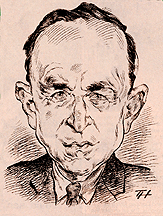
SURVEY - FT-IT REVIEW:
Watch the economics and the risk, not the technology
"Businesses are done with mere technology," says Paul Strassmann. "From now on, the role of the chief information officer is to make money."
Financial Times, Dec 5, 2001 [ Original article ]
By ROD NEWING and PAUL STRASSMANN
There is no correlation between investment in information technology and profitability. Although some companies achieve spectacular results through their use of IT systems, higher investment per employee does not result in higher return on equity.
This is the conclusion of research carried out over a number of years by Paul Strassmann, adjunct professor at the School of Information Warfare at the National Defense University in Washington and the Military Academy at West Point.
An associate of Butler Group, the analyst, he was previously director of defence information at the Pentagon and chief information officer at General Foods, Kraft and Xerox. Mr Strassmann started researching the relationship between strategic variables and profitability "out of sheer survival" in 1982, through the Strategic Planning Institute in Cambridge, Massachusetts.
"I had to be able to get up in front of not-always-friendly financial committees and explain why my budgets were growing faster than revenue or profits," he says.
"As the numbers got bigger, so the questions got much more pointed - and the explanations had to be increasingly of higher quality."
Mr Strassman's quickly learned to focus his justification on very specific corporate problems, rather than general benefits. Instead of using presentation slides, he walked in only with spreadsheets and cash-flow forecasts.
Mr Strassmann's research results have been published in a series of books since 1982 and have consistently shown that there is no correlation between IT investment and performance. His latest research is based on the accounts of 1,585 companies in the US.
Productivity growth
The McKinsey Global Institute's recent report into productivity growth, which is based on government productivity measures, largely supports Mr Strassmann's findings.
"Spending on information technology was not based on the laws of economics, but was an arms race," he says. "People spent money regardless, because they believed that if they didn't they would fall behind competitively. It was driven entirely by panic that somebody would outsmart them. I don't blame chief technology officers alone, because the whole of management over-focused on IT."
Mr Strassmann focuses on the cost of moving a dollar's worth of merchandise out of the factory and into the hands of a consumer, which has been increasing. "All sorts of additional labour has been put into offices, shuffling paper and messing around with computers," he says.
In fact, the research shows that only 27 per cent of costs in global IT budgets are for bought-in hardware, software and services. The other 73 per cent of costs are internal, but Mr Strassmann believes that this is going to change.
"Corporations are finally fed up with IT and they cannot afford escalating costs any more," he says. "They always compensated for incompetence by spending more money, but we are out of money now."
The solution is to move the IT into the hands of people who are competent to deliver the technology. This leaves the corporation to focus on the economics, rather than on the technology.
"We are done with technology," he says. "From now on, it's economics - and the role of the CIO is to make money. Technology has to be taken for granted. It must be available when you need it, how you need it, cheaply, reliably and securely. You have to worry about how to use it, not how to manage it."
Whereas IT costs are mostly fixed, outsourcing gives the corporation a known, predetermined variable cost per unit. Mr Strassmann sees the IT vendors changing their role. "Instead of being an arms supplier they are a mercenary," he says. "Every vendor, without exception, has announced their intent to pursue that direction, so the handwriting is on the wall."
Increasing issues of security
This move towards services and outsourcing is raising issues of security. The problem is that the vendors are creating major single points of failure. When an "information warfare" attack comes, it will be against all the vendor's customers, not just one company. This makes security and information warfare the dominant issue in the future development of IT.
Mr Strassmann was one of a small group of people who wrote the first ever policy on information warfare in 1992 "to the shock of everybody in the Pentagon". He now spends more than half his time teaching security and lecturing on information terrorism to senior government officials around the world.
"Nothing is secure any more," he says. "As a society, we will have to live with networks, databases, telecommunications, mobile devices and billions of computers and we will have to find ways of securing them. Management needs to start looking at security as part of the whole question of economics."
Information warfare has increased the risk premium used to set the discount rate in cash flow calculations for IT investment. This means that minimum return on investment (or "hurdle") rates will be higher, so costs will need to be tightly controlled and more benefits will need to be identified.
"When the relationship between profits and IT is random, it doesn't mean you can't make money with IT," he concludes.
"Some companies, such as Wal-Mart (the US retailer), did spectacularly well and absolutely dominate their business and profitability because of very strategic and smart use of IT.
"You can make enormous amounts of money out of computers if you know what you are doing and if you are looking for payoff, rather than glory.
"From now on, just watch the economics and the risk, not the technology."
Rod Newing
Copyright: The Financial Times Limited 1995-1998